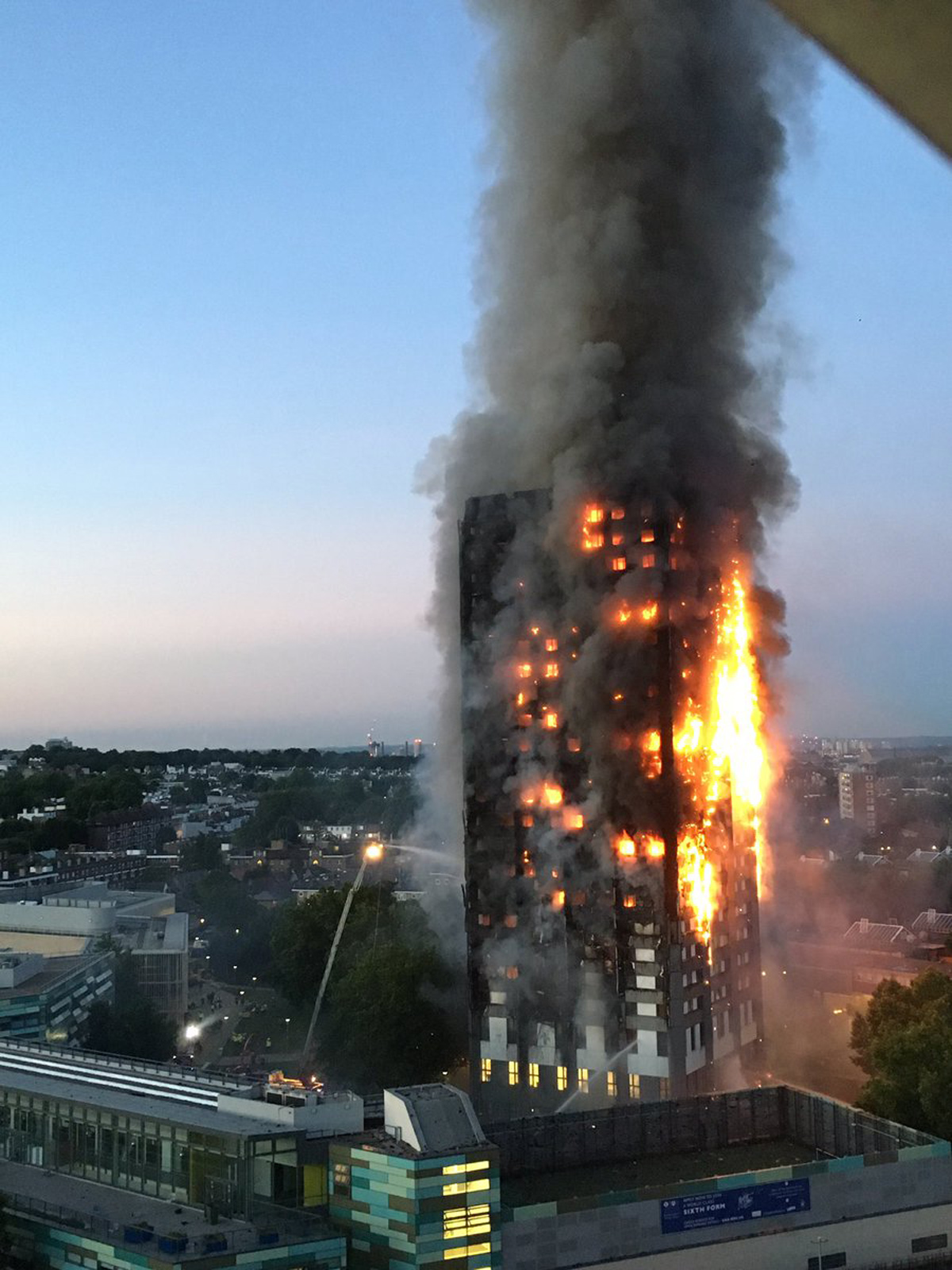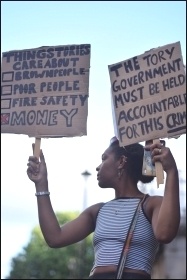- Concerns about safety were raised by residents
- Major investigation needed, independent of government
The Grenfell Tower blaze has killed many and destroyed the homes of many more, photo by @Natalie_Oxford (Twitter) (Click to enlarge: opens in new window)
Paul Kershaw, London Socialist Party
The fire at Grenfell Tower in west London spread with horrific speed and witnesses have described heart-rending scenes as residents attempted to escape. This is a terrible tragedy and there has naturally been an outpouring of sympathy and human solidarity with the residents and families affected.
There have been many fatalities and 74 people were taken to hospital; more than 20 ambulance crews attended. Details will come in over time but the courage of firefighters and local residents is immediately clear. We salute the courage of the firefighters, local residents and ambulance crews who responded with self-sacrificing speed.
But as well as huge sympathy and sorrow, there has been a big expression of anger from local people.
Members of the Unite housing workers’ branch report that, all over London, residents were approaching housing workers with their fears about the implications. There is real anger that residents’ concerns have not been listened to and that the terrible events may have been avoidable.
There has been a history of problems with maintenance of the block and residents have expressed concern at fire safety. Residents’ organisation Grenfell Action Group said they had repeatedly warned the owners of the block, Kensington and Chelsea Tory council, and Kensington and Chelsea Tenant Management Organisation, which manages the block, about “very poor fire safety standards” in the tower. They claimed their warnings “fell on deaf ears”.
Although Kensington and Chelsea is the richest part of the UK, it includes many working class residents. In fact, anger at the housing situation in the borough is one of the factors behind the surprise victory for the Labour candidate, who had campaigned on housing, in last week’s general election.
As well as the imperative need to rehouse the survivors, there is the issue of residents in surrounding blocks. They were evacuated because of the fire, but have now been moved back in – although the nearest tube stations are shut due to fears of debris falling on the line.
Many residents are worried that their homes are unsafe. This needs answers. If not safe, these other residents must be immediately accommodated elsewhere. If it is safe, issues such as the lack of hot water – the boiler for some surrounding blocks was in Grenfell Tower – must urgently be addressed.
The borough has 1,399 empty properties, mostly owned by the rich.
Advice to residents in Grenfell Tower was to stay in their flats in the event of fire because fire insulation would give time for emergency services to reach them. Survivors say how glad they are that they ignored this advice given the speed of spread.
Questions on refurbishment
Witnesses speak of the recently fitted outer cladding on the tower catching fire, raising questions about the fire-resistance of the materials – such questions are not new in housing. Notably, the Guardian’s Dawn Foster reports that Rydon, the company responsible for the cladding and retrofitting refurbishments at Grenfell Tower, has scrapped all references to the refurbishment from its website.
Outrageously, according to an article on the Independent’s website: “that cladding – a cheap way of improving the front of the building – was added in part so that the tower would look better when seen from the conservation areas and luxury flats that surround north Kensington, according to planning documents”.
Research by the Times newspaper has found that a version of the cladding with a “non-combustible” core would have cost a mere £5,000 more. That would have added 0.0006% to the reported £8.6 million refurbishment cost.
And Kensington and Chelsea Tenant Management Organisation papers show they hired a fire risk consultant who “was willing to challenge the fire brigade on our behalf if he considered their requirements to be excessive.” Their other consideration seems to be that he offered the “most competitive price.”
It was described as an “unprecedented situation” by the London Fire Brigade. Matt Wrack of the firefighters’ union the FBU, on Sky, said it shouldn’t be possible for fire to develop in this way and the union is calling for a major investigation to be made into the building. A call echoed by the Unite housing workers’ branch.
As with the recent terrorist attacks, this horrendous event also brings into sharp focus the fact that the number of firefighters has been cut in London by 550, with ten stations closed and others with appliances reduced. The number of fire deaths has risen over the last year and figures for waiting times in accident and emergency departments and ambulance response times have failed to meet targets. NHS services are at breaking point and facing further cuts.
National implications
The causes of this fire are not yet confirmed but there must be concern that the issues raised point to unacceptable risk around the country.
The All-Party Parliamentary Fire Safety and Rescue Group of MPs has been calling for a review of building regulations for years. Failings were uncovered following a devastating tower block fire at Lakanal House in Southwark in 2009, which killed six people. The failings then included a lack of fire risk assessments, and panels on the outside walls not providing the necessary fire resistance.
Then-housing minister Gavin Barwell said in the Commons last October that the government will review Part B of Building Regulations 2010, which relate to fire safety, “following the Lakanal House fire”. Ronnie King, a former chief fire officer and secretary to the parliamentary committee said the building regulations “haven’t taken account of the Lakanal House fire inquest, or updated recent accredited research” (Inside Housing, 7 March 2017).
In fact, research by Inside Housing, an industry magazine, found in 2015 that just 1% of tower blocks have sprinklers fitted, in spite of the Lakanal findings.
The issue was that cladding to improve heat insulation undermined fire safety. Inside Housing magazine was unable to get a date for the review from the government at that time. Gavin Barwell, the housing minister responsible at the time the building regulations review was delayed, lost his seat in last week’s election and has now been parachuted in as Theresa May’s chief of staff.
A survey by the Department for Communities and Local Government in February found that regulations are “far too complex” to guarantee high-quality buildings. The judge in the Lakanal inquest called them “incomprehensible.” But when Barwell was pressed on the matter in March, he was still stonewalling about a review of the regulations.
Chancellor Philip Hammond has said the cladding is banned in the UK – but the above evidence suggests it could be difficult to tell if this is the case. The manufacturer disputes it, of course.
Either way, members of West London Socialist Party spoke to another Socialist Party member who is a construction engineer. The engineer believes bad practice is very prevalent, particularly among small contractors such as used here – and says that councils’ cutbacks mean effective enforcement of regulations is almost non-existent.
Simply changing the building regulations would not be an adequate response as existing buildings would need to be reviewed. The cost implications could be significant but austerity cannot be allowed to delay a response.
- It is essential that the 400-600 people made homeless are rapidly rehoused locally in secure and affordable accommodation. Tenants must have permanent secure tenancies, not assured shortholds or other tenures, and leaseholders must have proper arrangements as well. The government must move fast and no talk of lack of money can be accepted in this situation.
- We need a major investigation into the Grenfell fire and the implications for housing around the country. That investigation must be genuinely independent of government and must be free to draw out the implications of spending cuts and to make recommendations that do not compromise safety because of austerity. It must be led by trade unions and residents groups drawing on independent expertise. There must be criminal prosecutions where appropriate.
- All councils should immediately inspect safety on every housing estate and invest urgently, with no excuses about cuts, in ensuring safe materials, adequate exits and space, etc
- Labour councils should refuse to pass on any further cuts. Stop all privatisation of housing, repairs and renovation!
- London mayor Sadiq Khan should reverse all cuts to the London fire service.
- The site must remain publicly owned – no concessions to vulture property speculators.
- Residents in nearby housing must have their concerns over safety near the ruined tower answered. They must be rehoused safely if there is any danger – and if there is not, urgent maintenance and upgrade work must be carried out due to the damage to the estate.
- The decision on whether to keep or demolish high-rise blocks must lie with the residents themselves. Tower blocks are safe if properly built and maintained. If, however, residents would prefer low-rise accommodation, the council must build it and fight for the funds to do it properly – like the Liverpool Labour council of 1983-87 did, led by Militant (now the Socialist Party).
The above article was expanded and updated on 19.6.17.
West London Socialist Party member Bob Sulatycki commented:
“It’s already quite clear that this isn’t a tragic accident but the predicted and criminal result of the policies of cuts, privatisation, lack of democratic accountability and wilful neglect carried out locally and nationally.
All tenants in social housing in the area and beyond will be thinking about the importance of what’s happened.
There are ongoing cuts to NHS provision in the area, including to the A&Es at Charing Cross and other local hospitals that are currently taking casualties but are faced with cuts and closures.”
Read more – urgent action needed
- How working class communities can organise to fight for safety
- Whole establishment exposed for role in Grenfell fire
- Unions call for action after Grenfell
- Anger and grief on moving Grenfell marches
Latest on Grenfell
- After Grenfell – fight for safe homes
- Camden evacuation – residents expose risks – Blairites duck responsibility
- Grenfell fire compounded by overcrowding: build more council homes now
- Reports: organising to fight for safe homes after Grenfell
- Council union responds to Grenfell
This version of this article was first posted on the Socialist Party website on 14 June 2017 and may vary slightly from the version subsequently printed in The Socialist.










